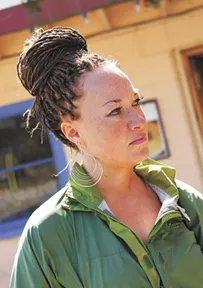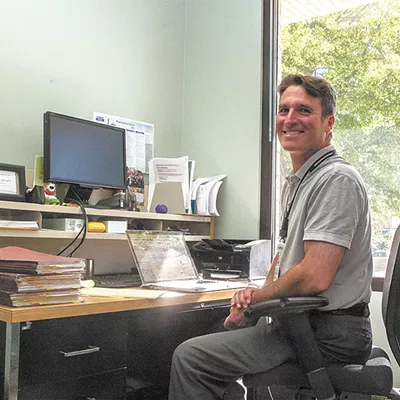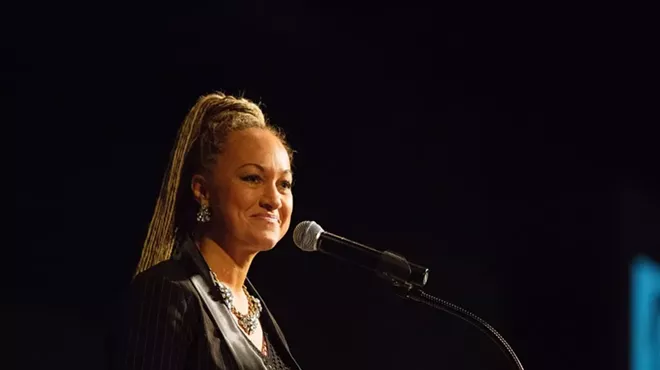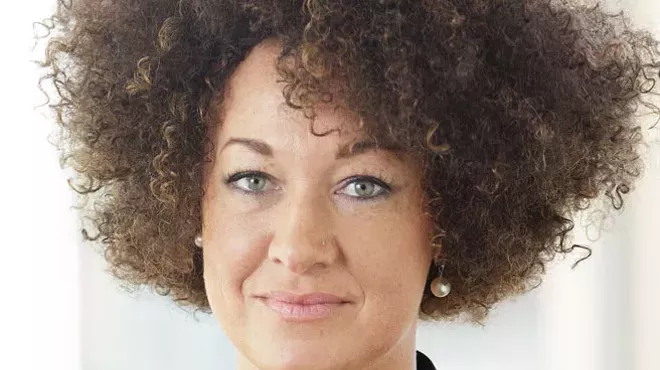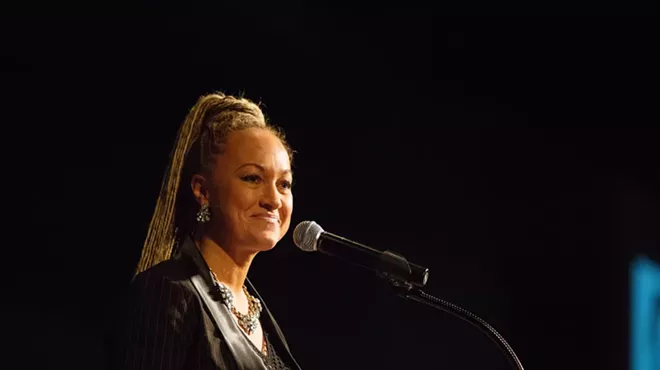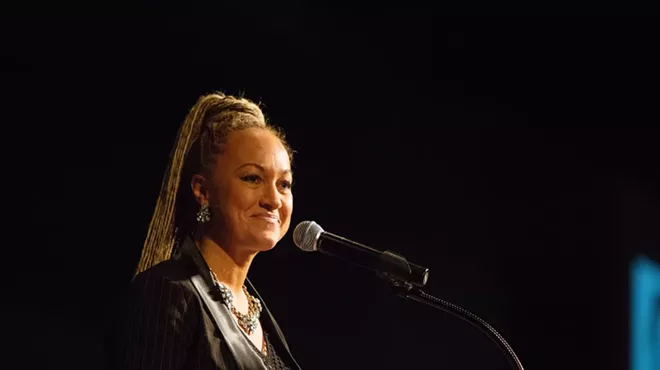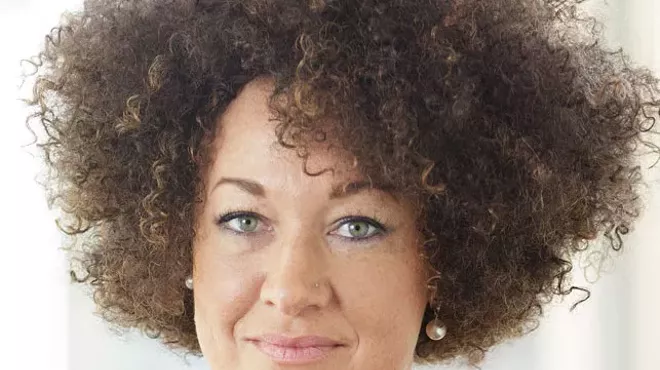Friday, June 19, 2015
76 false or otherwise #problematic statements from Rachel Dolezal, and counting
The national media have largely moved on from the Rachel Dolezal story, turning their attention to far more disturbing events. But Dolezal — a black leader revealed to be white — remains a significant story in the community she repeatedly lied to. While many have pointed to her actions as evidence of the region’s struggles with racial issues, they fit even more cleanly into Spokane’s saga of getting fooled by scammers,
This compilation of Dolezal’s lies and other fishy actions can’t hope to be complete, but the goal is to give an idea of the sheer scale of Dolezal’s deceptions. Some deceptions are tiny. Some are massive. Other statements may not be lies at
1. Dolezal has repeatedly lied or represented that she is "black" or "multiracial." She is not. Yet she has made this claim in a variety of venues, including checking “African-American” on her application to the Spokane Office of Police Ombudsman.
2. ... Dolezal cringed at having to correct women who touch her hair and says she’s, like, “just please don’t do this to another black woman.”
3. ... Referring to Black History Month, Dolezal wrote, “Our story should be taught year round.” It’s not her story.
4. ... In an Inlander column, Dolezal referred to herself as a “black feminist like bell hooks and Harriet Tubman.”
5. ... In an Inlander column, Dolezal said her son doesn’t see the other black kids at the school as black, and “distinguishes himself as the only black kid at his school actually being raised by a black parent."
6.... In an interview in April with Inlander journalist Lael Henterly, Dolezal said, discussing the NAACP, “We’re black, we must be careful with our civil liberties.”
7. Dolezal has also repeatedly claimed that her adopted brother, Izaiah, is actually her son. For example, in an Inlander column, Dolezal calls herself “a mother raising two black sons.”
8. ... In an Inlander column, Dolezal refers to arguments with her “teenage sons,” plural.
9. ... In an interview with Melissa Harris-Perry, Dolezal said, “First of all, it means that I have really gone there with the experience in terms of being a mother of two black sons and really owning what it — what it means to experience and live blackness.”
10. ... In her first Inlander column, Dolezal said that “my black son is completing his degree.”
11. Dolezal has also repeatedly represented Albert Wilkerson, Jr., a black man, as her real father. In fact, he's a friend of hers, but not her biological father. For example, Idaho Rep. Paulette Jordan tells the Inlander when Dolezal served as her campaign manager that Dolezal “made it clear that she has part-black and part-native heritage,” and that
12. ... City Councilman Jon Snyder and Spokane Police Officer Cliff Walter say Dolezal said her father was an Oakland police officer. An “Albert Wilkerson,” not her father, is listed as receiving a police officer pension, but in San Diego, not Oakland.
13. ... Dolezal told radio host Taylor Weech that her father had three attempts on his life by white subordinates when he was in the
14. ... Confronted by KXLY reporter Jeff Humphrey, Dolezal repeatedly said that Wilkerson was her dad. Asked if her parents were white, she fled.
15. ... In a single Facebook photo last December, Dolezal labeled her adopted brother her son, and her black friend her dad.
16. Dolezal told a student journalist that her mother and her “stepfather” moved to Colorado. In fact, that was her real father.
17. Dolezal told a student journalist she was punished with a “baboon whip… pretty similar to what was used as whips during slavery.” She wasn’t.
18. Dolezal told a student journalist that she was “born in a teepee.” She wasn’t.
19. Dolezal told a student journalist that “Jesus Christ” was listed as the witness on her birth certificate. Jesus is not. Her brother Joshua, however, makes the same claim about his birth certificate in his memoir. (She has since produced a document she claims is her "original" birth certificate, that does include "Jesus Christ" as a witness.)
20. Dolezal told a student journalist she lived in South Africa as a child. She has never even been there.
21. Dolezal told a student journalist, “My real dad is my only extended family.” She at least has an uncle.
22. In her application essay to Howard University, a historically all-black college, Dolezal wrote, “I plunged into black history and novels, feeling the relieving release of understanding and common ground… My struggles paled as I read of the atrocities so many ancestors faced in America.” Dolezal does not, to anyone’s knowledge, have so many black ancestors.
23. Dolezal has recently justified her 2002 lawsuit against Howard University for racial discrimination by saying it was because she was being perceived as white. But in the deposition in the suit, Dolezal said, “I consider myself to be Caucasian biologically.”
24. To Melissa-Harris Perry on MSNBC, Dolezal said, “I’ve never said, oh, I’m transracial.” In her Howard admissions essay, she described her family as "transracial" (though that term likely was understood in a different way back then).
25. Dolezal has claimed that the media, not her, began representing herself as “blacker and blacker and blacker” the more she was the victim of hate crimes, and she just didn’t correct them. In fact, she told police as early as 2009 — when the alleged hate crimes occurred — that she was being targeted because of her “race” and her “bi-racial heritage.”
26. Furthermore, investigative journalist David Barstow still has his notes from interviewing Dolezal in 2010. He confirms she identified herself directly as multi-racial.
27. Dolezal said the Miami Herald and the Chicago Tribune once called her “a dark skin black woman.” ColorLines dug through archives of both papers and couldn’t find any older reference to Dolezal at all.
28. Dolezal says her full-tuition scholarship to Howard University was removed after she was told that “other people needed opportunities” and she probably had “white relatives” that could afford to help her with tuition. Court documents show that, despite not following the normal application process, she was awarded the scholarship anyway.
29. Dolezal claims that Howard University removed her from her teaching assistant position as well as alleges discrimination. The truth: The administrator did not learn of her interest in the TA position until after it was filled, and paid Dolezal for that semester anyway.
30. Dolezal tells KREM and Human Rights Commission
31. On Facebook, Dolezal claimed that “Two white adults broke into my home while I was testifying at City Council tonight. Scared my 13-year-old son to death.” In fact, Dolezal’s son told police he “wasn’t scared at all” and the confused couple who wandered in the house were not threatening.
32. In an April interview with Inlander reporter Lael Henterly, Dolezal continued to push the idea that slain 88-year-old veteran Delbert Belton was a drug dealer. The claims had been dismissed as unfounded by police years earlier.
33. On her LinkedIn page, Dolezal represents herself as an “Adjunct Instructor” at Whitworth, but a “Professor” at Eastern Washington University. An EWU spokesperson said “Dolezal was listed as a professor but she was never a professor,” but rather an “adjunct instructor hired on a quarterly basis.”
34. On her LinkedIn page, Dolezal also claims to have taught adjunct courses at Whitworth University from 2011 to January 2015. Whitworth communications director Nancy Hines said she only taught two adult education courses during her career, one in 2011, another in the fall of 2014.
35. In discussing the spate of hate crimes lobbed against her, Dolezal told an EWU student: “There’s 'NIGER' written on the street with the arrows pointing toward the house... it had escalated.” The word — misspelled or in reference to the African nation Niger — was written months before Dolezal moved into the house with boyfriend Dexter Green, an actual black man. Green had dismissed it as just “neighborhood kids messing around.”
36. In a 2012 Spokane/Coeur d'Alene Living article titled "A Radical Mongrel," Dolezal claimed to also have Arabic and Jewish heritage. Her parents do not include this in their description of her lineage. A Daily Mail investigation into her genealogy found Mormon
1. A neighbor told police that he’s 90 percent sure that the rope that Dolezal claimed was a noose in 2010 was actually left over by him to hang deer. He says he told Dolezal that, but Dolezal denies it.
2. Dolezal told the Coeur d’Alene Press that she was resigning from the Human Rights Education Institute because she was the "target of discrimination.” The Institute, confused by the charge, denied it.
3. On Facebook, Dolezal said the group that sent the “War Pig” letter is known as a “viciously violent hate group that rides motorcycles.” That doesn’t seem to be the case. The FBI, U.S. Postal Service, postal inspectors and the Spokane police searched for a group of
4. Dolezal, in multiple interviews, said she drew her self-portrait with a brown crayon instead of a peach crayon in kindergarten. She's posted a drawing, surprisingly undamaged for being three decades old, which supposedly backs her up. Her parents say she’s lying.
5. Dolezal said she was physically abused as a child by her parents. Larry
6. Similarly, Rachel’s mother said that the reason Joshua Dolezal is on trial for sexual abuse of his younger sibling is partly because of “a malicious false lie” made by Rachel. (A Missouri Social Services investigation found there was “no basis for the allegations.”) Rachel also says her younger brother assaulted her back in 1991.
7.
8. Dolezal claims she was born “in the woods” and expresses doubt about her parentage. “She was born in our bedroom 11/12/1977 in our house we built here and moved into in June 1977,” father Larry Dolezal writes in an email. (To be fair, she could be, theoretically, referring to a bedroom in a little house in the big woods.)
9. In a 2005 note, Dolezal's ex-husband Kevin Moore complained that Dolezal had told their son that, “I have ‘monsters’ in my house.” Dolezal's brother's memoir, however, calls Moore abusive and controlling.
Attempts to prevent the spread of factual information (4 examples)
1. According to former EWU student reporter Shawntelle Moncy, Dolezal asked
2. Ezra Dolezal, one of Rachel Dolezal’s adopted brothers, claims she asked him “not to blow her cover about the fact that she had this secret life or alternate identity.”
3. An investigation found that Dolezal and several other Office of the Police Ombudsman commissioners had attempted to alter meeting minutes to remove criticism.
4. After NAACP member Kitara Johnson started a petition asking Dolezal to take a leave of absence from the NAACP, Dolezal sent her a text saying, “don’t contribute to the drama.”
1. After viewing The Help, Dolezal expressed disgust that “a white woman makes millions off of a black woman's story."
2. In a podcast with Taylor Weech, Dolezal called for boycotting Exodus because it cast white actors in black roles.
3. Buzzfeed reported that Dolezal told a student that she did not look Hispanic enough to represent the race in an activity.
4. Anti-racism activist Tim Wise, a white guy, said Dolezal didn’t want him to speak at Eastern Washington University because “white folks can’t speak with any legitimacy to issues of racism.” “Let the irony marinate there for a minute,” Wise added.
5. Black Puerto Rican activist Rosa Clemente said Dolezal insisted the Black Lives Matter movement should only be for blacks. Clemente is not happy with her.
6. In an interview with an EWU student, Dolezal said that having a black relative or spouse doesn’t mean you really get the black community: “You’re using that to justify something — kind of a free pass… It doesn’t mean you understand or identify with the struggle and liberation of that community.”
7. In the New York Times, the “multiracial” Dolezal says the all-white crowds at Tea Party rallies make her “nervous.”
8. In her first Inlander column, Dolezal condemns concealed weapons as “made for no other purpose than to kill human beings.” In her interview with Shawn Vestal back in March, a small handgun was on her table. Dolezal suggested getting a “bigger gun” when she sat for a photograph.
9. In an April interview with Inlander reporter Lael Henterly, Dolezal regularly referred to slain veteran Delbert Belton with air-quotes around the “veteran,” implying he wasn’t actually a veteran. He was. Dolezal’s real dad was not.
10. In a since-deleted blogpost, Dolezal’s adopted sister Esther said, “She talks about being real and not lying to people. But she’s been lying to all of her friends. She says she’s African American, but she’s German Caucasian … She's all about representing your race, but she abandoned her own. She's a living contradiction, but she wants to critique everyone else about being a hypocrite.” (Later Esther said she “fully supports” her sister.)
11. In her Easterner profile, Dolezal claims she doesn’t really care about “titles.” This is her email signature.
12. In an interview with Inlander reporter Lael Henterly, Dolezal said that when she had met with City Councilmember Mike Fagan, she asked him to change the location of their meeting to a local soul food restaurant. “He tried to tell me he knows what it’s like to be a person of color,” Dolezal told Henterly. “He said because he’s part-Japanese. I was like ‘no, that is not the same.’”
13. In a statement refusing to resign from the Office of the Police Ombudsman Commission, Dolezal said the “level of harassment and sabotage by city government is completely undeserved and inappropriate.” But the independent investigation of Dolezal found that she and two other commissioners were the ones guilty of harassment, humiliation, insults, degradation, misrepresentation, exceeding the scope of their authority, the release of confidential information, and violations of the state Open Public Meeting Act. Dolezal was unanimously removed from the commission on Thursday.
1. Dolezal’s painting, "The Shape of Our Kind,” which she represents as original, appears almost identical to “J.M.W. Turner's 1840 The Slave Ship.”
2. Dolezal’s painting “Pariah” appears lifted directly from an advertisement for a movie called, well, Pariah.
3. Dolezal’s painting “Alike World” appears to be a screenshot from the movie Pariah, printed onto a canvas and then “touched it up with clear acrylic gesso and paint,” blogger David Castillo writes.
4. While this Inlander column mentions that it “recalls” Peggy McIntosh’s famous piece, "White Privilege: Unpacking the Invisible Knapsack," Dolezal lifts entire phrases from it unchanged, without quotation marks. The Office of Undergraduate Studies for Eastern Washington University suggests, “If you use the words of another author but fail to put quotation marks around them, that’s plagiarism."
1. In Dolezal's EWU profile, it's stated that “during her time at Howard, her paintings sold quite well in convention centers around the nation, the highest for around $10,000.” A D.C. art blogger finds that story, and that price, to be very unlikely.
2. Dolezal claimed her family had to wake up to scrub the N-word off of signs when her dad was running for commissioner. Her real father was a county commissioner, but a white man.
3. In the Easterner, Dolezal claims to have gone through chemotherapy for cervical cancer in 2006, when she put on “incredibly long, blonde dreadlocks.” Her cancer claims seem absent from other narratives of her life, and her adopted brother Ezra says, “She didn’t mention anything about having cancer until very recently.”
4. Journalists attempting to tally Dolezal’s claim of 8 or 9 “documented” hate crimes have come up short.
5. When a swastika was posted on the door of the Human Rights Education Institute in 2010, the surveillance cameras weren’t working. Dolezal told the Coeur d’Alene Press: "We had a power surge, a power outage kind of thing, which reset our system the week before that happened." Many are suspicious of this claim.
6. Dolezal claimed to have received a threatening letter in the NAACP P.O. box, but police discovered the letter didn’t have a postal stamp, making it unlikely it had been sent through the mail.
7. In an interview with the Easterner, Dolezal claimed that white supremacy groups threatened to kidnap her son. If true, she hasn’t reported that to the Coeur d’Alene or Spokane police.
8. In an Inlander column, Dolezal claimed to have worked as a “sushi chef.” While “sushi” is listed as one her interests on her LinkedIn page, no sushi chef employment is listed. But, as a bonus, here’s an Atlantic piece over whether race matters for sushi chefs.
9. Dolezal's EWU profile says, “Doležal also entertains an interest in the medical field and has begun pre-medical studies, working toward an MD and a residency in trauma surgery. She hopes to combine her medical knowledge with her passion for human rights and engage in life-saving surgery efforts around the world.” This claim is strangely absent from other coverage of Dolezal. Her ex-husband, however, was a medical student at Howard University.
10. On Facebook, Dolezal claimed that her son was harassed by two white males — and called the N-word — just a block from her house. Grocery store surveillance photos showed that her son’s claims of running from the males, knocking over wine bottles, are false. Dolezal’s son’s friend disputed that anything out of the ordinary happened. We do not know if or when Dolezal learned this was untrue.
——-
After all this, Dolezal says, "I stand by my record."
Tags: Rachel Dolezal; race; hate crimes , News , Image

